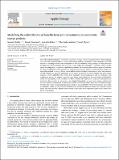Modelling the redistribution of benefits from joint investments in community energy projects
Author(s)
Norbu, Sonam; Couraud, Benoit; Robu, Valentin; Andoni, Merlinda; Flynn, David
Download1-s2.0-S0306261921001215-main.pdf (1.102Mb)
Publisher with Creative Commons License
Publisher with Creative Commons License
Creative Commons Attribution
Terms of use
Metadata
Show full item recordAbstract
Given the widespread adoption of renewable generation, storage and new loads like electric vehicle charging, there has been a growing effort to enhance local energy resilience, particularly at the community level. This has led to increasing interest in the development of local or community energy projects, in which individual prosumers are able to generate, store and trade energy within the community — enabling a shift in market power from large utility companies to individual prosumers. Such schemes often involve a group of consumers investing in community-owned asset such as community-owned wind turbines or shared battery storage. Yet, developing methods to enable efficient control and fair sharing of jointly-owned assets is a key open question, of both research and practical importance. In this paper, we provide a method inspired from game theory concepts to fairly redistribute the benefits from community owned energy-assets such as community wind turbines and storage. We propose a heuristic-based battery control algorithm for maximization of behind-the-meter self-consumption, which considers the effect of battery life degradation. Using real consumption and production data to model a community of two hundred households, we assess and compare technical and economic benefits of investment in individually-owned or community-owned assets such as chemical storage. We show that battery storage simple pay-back period can be considerably reduced by sharing the asset within a community. Finally, we compare several redistribution and benefit allocation schemes for community-owned assets, and show that the proposed scheme based on principles from cooperative game theory achieves the fairest redistribution.
Date issued
2021-02Department
Massachusetts Institute of Technology. Center for Collective Intelligence; Sloan School of ManagementJournal
Applied Energy
Publisher
Elsevier BV
Citation
Norbu, Sonam et al. "Modelling the redistribution of benefits from joint investments in community energy projects." Applied Energy 287 (April 2021): 116575. © 2021 The Authors
Version: Final published version
ISSN
0306-2619